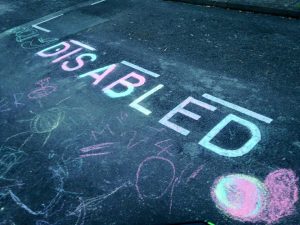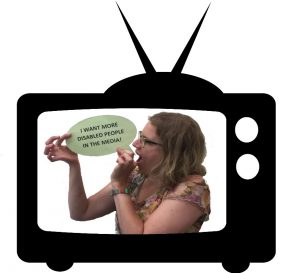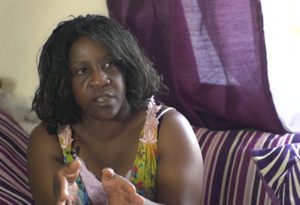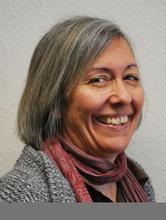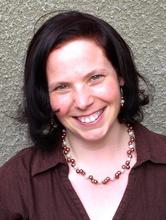Professor Val Williams, from the Norah Fry Centre for Disability Studies, discusses tackling disabled practices and how we all have a part to play in getting things changed.
When times get tough, disabled people always seem to go to the bottom of the pile. It’s as if the problem of ‘disability’ is always one step too far, or something which cannot be contemplated until everything else is sorted out. For instance, the debates about BREXIT have centred on trade agreements and free movement of citizens. How often do we talk about the rights of disabled people, and how they may be protected under existing EU legislation?
The UK itself has laws to protect disabled people’s rights, with the 2010 Equality Act. But constant vigilance is needed to remind public services that they have a duty to provide reasonable adjustments for disabled people. UK financial cuts are impacting most heavily on disabled people, and a recent report by the charity SCOPE highlights that, on average, for every £100 earned by a disabled person, only £67 is left after disability-related costs.
Disabled people certainly incur additional costs by virtue of their additional needs, but is disability too much of a ‘cost’ for society? We would argue that the reverse is true: economic, political or social crises create moments when disabled people must be at the forefront. This is what we have been documenting in our project ‘Getting Things Changed’ (Tackling Disabling Practices: Co-production and Change).
Disabled people have always faced problems which are created because society is structured without disability in mind. For instance, the rail transport system assumes that all passengers can step over a gap between a train and the platform, that they can walk to their seat, and indeed that sitting in a ‘standardised’ seat is an option. At a more subtle level, we have also found countless practices in our study which exclude or marginalise disabled people. The way things routinely get done in everyday life can be problematic, and that can include the material infrastructure of a building as well as the ways in which people interact. For instance, people with dementia might rely on familiar, clear signage to find their way in and out of a building, or the facilities in it, but they also need people who will give them time to communicate, or understand how to wait for a response in a respectful way. In parts of our project, we are looking at the barriers disabled patients face in English hospitals. With regular news items about the crisis in the hospital system, we know that change must happen.
We argue that this is the time to include disabled people, not just as recipients of care, but as change makers. Our project is co-produced with Disability Rights UK and with other groups of disabled people who are actively involved in the research. Given that disability is part of humanity, we should all be working WITH people with disabilities, to create a more just society where all are included.
Understanding a disabling society
So how can we start to understand why things get stuck? Since the 1980s and the introduction of the social model of disability, Disability Studies theory has focused considerable attention on the dichotomy between the social and medical model of disability. There have been continual debates since that time, with UK theorists arguing since the 1980s for a new understanding of disability and impairment. Oliver (2013) sums up neatly what the real issues are now:
“While all this chatter did not matter too much when the economy was booming, now it no longer booms it is proving disastrous for many disabled people whose benefits and services are being severely cut back or removed altogether”
Have disabled people’s lives become more restricted since the 1980s, or have the concerns of disabled people themselves been overtaken by theoretical debate? And how can we as activists and academics change that tide? In our recent article from ‘Getting Things Changed’ we argue that we need as a society to go further than debates about ‘what is disability’. The social model directed our attention towards the external barriers facing disabled people, and now we need to find better ways of analysing and understanding those barriers. Many people use the word ‘culture’ here, to bemoan the difficulties caused by unhelpful attitudes and approaches which can be evident in congregate services such as care homes or hospital. In our study, we have turned towards the ideas of social practice theorists such as Elizabeth Shove, which have helped us to understand how things get done, how practices get shaped – and therefore how we can get a handle on change.
An example from our wide-ranging project comes from the insights of people with dementia. Since 2009, we have had an English Government policy called ‘Living Well with Dementia’ . What matters for people with dementia is the quality of life they are leading right now, and our work with the ‘Forget-me-Not’ group from Swindon has helped us to unpick what this might mean.
Here are some words from the researchers with dementia from the Forget-me-Not group:
“Everyone will tell you the same thing. You’re diagnosed, and then it’s ‘You’ve got dementia. Go home and we’ll see you next month’. What we need is for someone, like a counsellor or someone else with dementia, to tell us at that point ‘Life isn’t over’. You can go on for ten or fifteen years. And you’re not told, you’re just left. And I thought, tomorrow my day had come. The fear and the anxiety sets in, and then the depression sets in, doesn’t it? I think when you’re diagnosed, you should be given a book. And on the front of the book, in big letters, it should say: ‘Don’t panic’.”
In terms of social practice theory, these are people who do not want to be seen through a medical lens as individual tragedies, but are turning around the whole meaning of dementia into something where they are in control, can support each other and where they have a voice. However, social practice theory also reminds us about the importance of material resources. For instance, in order to meet each other and to have a collective sense of peer support, people need to have spaces which are not institutionalised, which they feel they can ‘own’. All too often, we have seen very well-intentioned group activities taking place in old, large halls, or where people are routinely sitting in configurations which make communication difficult. But we have also seen the Forget-me-Not group, in an ordinary, homely environment, where staff members interact on a basis of equality with the members who have dementia.
This is just one of many examples where we are finding that people CAN do things differently, and where the ‘culture’ can change towards inclusion and empowerment. We hope our research will provide the impetus to take some of this further.
Change will never be completed – but we will be presenting the latest research from our project and discussing some of these ideas at our launch event on 25 May. Book your place now to find out more about the many strands of the project how we can all be change-makers.
This post was written by Prof Val Williams with assistance from Prof Pauline Heslop, Beth Tarleton, Wendy Merchant, Bernd Sass and Joe Webb at the Norah Fry Centre for Centre for Disability Studies.


